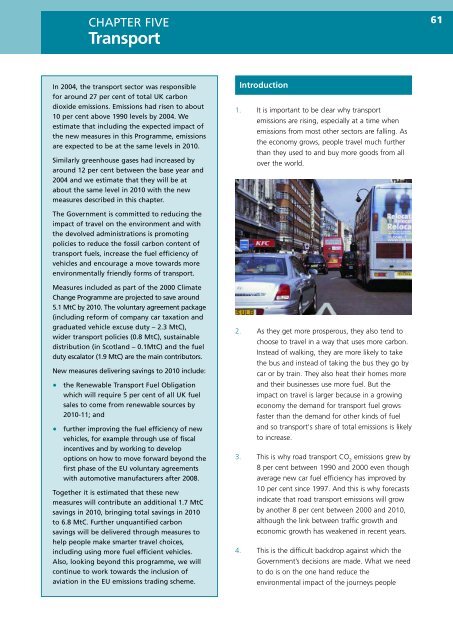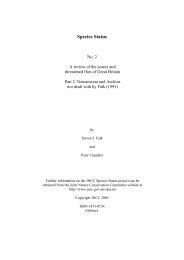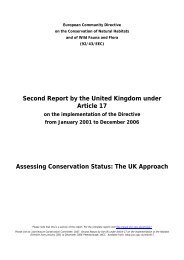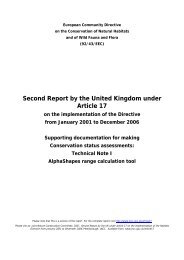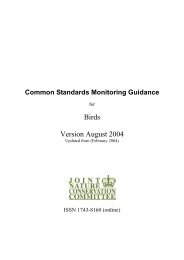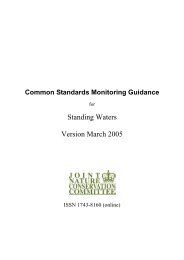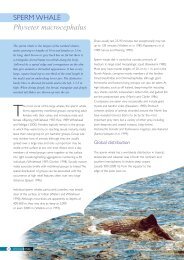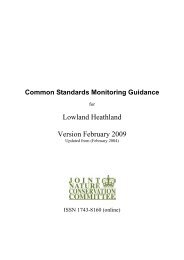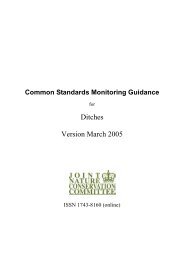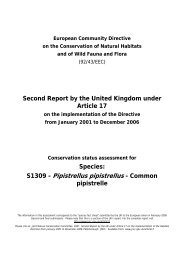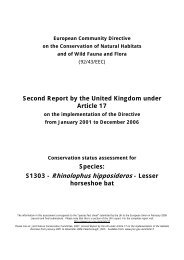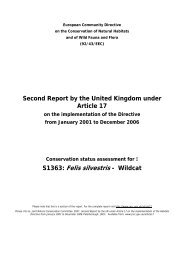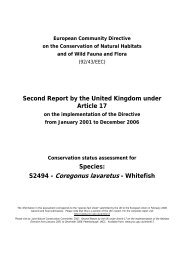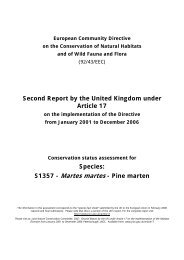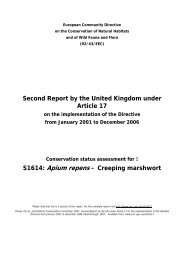UK Climate Change Programme 2006 - JNCC - Defra
UK Climate Change Programme 2006 - JNCC - Defra
UK Climate Change Programme 2006 - JNCC - Defra
Create successful ePaper yourself
Turn your PDF publications into a flip-book with our unique Google optimized e-Paper software.
CHAPTER FIVE<br />
Transport<br />
61<br />
In 2004, the transport sector was responsible<br />
for around 27 per cent of total <strong>UK</strong> carbon<br />
dioxide emissions. Emissions had risen to about<br />
10 per cent above 1990 levels by 2004. We<br />
estimate that including the expected impact of<br />
the new measures in this <strong>Programme</strong>, emissions<br />
are expected to be at the same levels in 2010.<br />
Similarly greenhouse gases had increased by<br />
around 12 per cent between the base year and<br />
2004 and we estimate that they will be at<br />
about the same level in 2010 with the new<br />
measures described in this chapter.<br />
Introduction<br />
1. It is important to be clear why transport<br />
emissions are rising, especially at a time when<br />
emissions from most other sectors are falling. As<br />
the economy grows, people travel much further<br />
than they used to and buy more goods from all<br />
over the world.<br />
The Government is committed to reducing the<br />
impact of travel on the environment and with<br />
the devolved administrations is promoting<br />
policies to reduce the fossil carbon content of<br />
transport fuels, increase the fuel efficiency of<br />
vehicles and encourage a move towards more<br />
environmentally friendly forms of transport.<br />
Measures included as part of the 2000 <strong>Climate</strong><br />
<strong>Change</strong> <strong>Programme</strong> are projected to save around<br />
5.1 MtC by 2010. The voluntary agreement package<br />
(including reform of company car taxation and<br />
graduated vehicle excuse duty – 2.3 MtC),<br />
wider transport policies (0.8 MtC), sustainable<br />
distribution (in Scotland – 0.1MtC) and the fuel<br />
duty escalator (1.9 MtC) are the main contributors.<br />
New measures delivering savings to 2010 include:<br />
• the Renewable Transport Fuel Obligation<br />
which will require 5 per cent of all <strong>UK</strong> fuel<br />
sales to come from renewable sources by<br />
2010-11; and<br />
• further improving the fuel efficiency of new<br />
vehicles, for example through use of fiscal<br />
incentives and by working to develop<br />
options on how to move forward beyond the<br />
first phase of the EU voluntary agreements<br />
with automotive manufacturers after 2008.<br />
Together it is estimated that these new<br />
measures will contribute an additional 1.7 MtC<br />
savings in 2010, bringing total savings in 2010<br />
to 6.8 MtC. Further unquantified carbon<br />
savings will be delivered through measures to<br />
help people make smarter travel choices,<br />
including using more fuel efficient vehicles.<br />
Also, looking beyond this programme, we will<br />
continue to work towards the inclusion of<br />
aviation in the EU emissions trading scheme.<br />
2. As they get more prosperous, they also tend to<br />
choose to travel in a way that uses more carbon.<br />
Instead of walking, they are more likely to take<br />
the bus and instead of taking the bus they go by<br />
car or by train. They also heat their homes more<br />
and their businesses use more fuel. But the<br />
impact on travel is larger because in a growing<br />
economy the demand for transport fuel grows<br />
faster than the demand for other kinds of fuel<br />
and so transport's share of total emissions is likely<br />
to increase.<br />
3. This is why road transport CO 2<br />
emissions grew by<br />
8 per cent between 1990 and 2000 even though<br />
average new car fuel efficiency has improved by<br />
10 per cent since 1997. And this is why forecasts<br />
indicate that road transport emissions will grow<br />
by another 8 per cent between 2000 and 2010,<br />
although the link between traffic growth and<br />
economic growth has weakened in recent years.<br />
4. This is the difficult backdrop against which the<br />
Government’s decisions are made. What we need<br />
to do is on the one hand reduce the<br />
environmental impact of the journeys people


